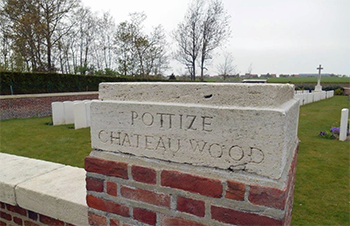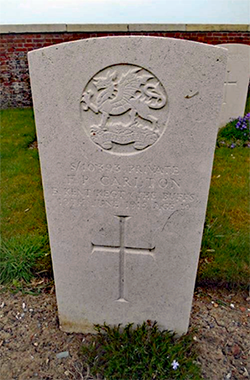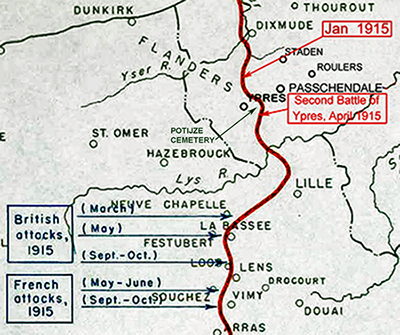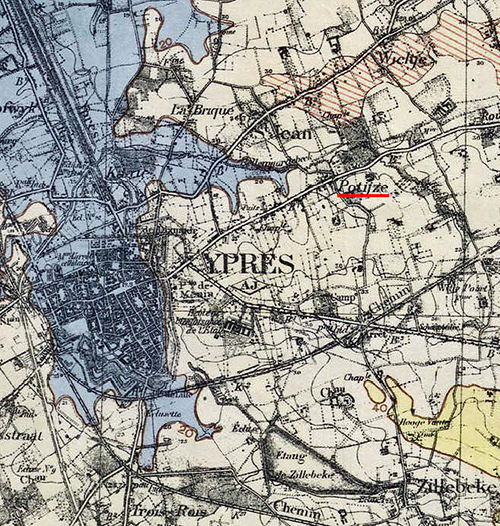First World War Project
Frederick Percy CARLTON (of Lynsted)
b. January 1897 Private, S/10303 |

 Frederick is the youngest of our casualties, being born in Petham in January 1897 to Henry and Anna (née Marsh). The family later moved to Perry Cottages in Chartham and eventually to 1 Devon Villas, Greenstreet. One of nine children, Frederick had 4 elder sisters; Margaret, who died in 1899 aged 17 years, Sarah, Lucy and Edith. There were also two elder brothers, William and Charles, and one younger sister, Laura.
Frederick is the youngest of our casualties, being born in Petham in January 1897 to Henry and Anna (née Marsh). The family later moved to Perry Cottages in Chartham and eventually to 1 Devon Villas, Greenstreet. One of nine children, Frederick had 4 elder sisters; Margaret, who died in 1899 aged 17 years, Sarah, Lucy and Edith. There were also two elder brothers, William and Charles, and one younger sister, Laura.
On leaving school, aged 14, Frederick took up employment with Messrs Mercer and Co as a brickfield labourer.
On Friday 15 March 1912, Frederick signed up for a period of 4 years with the Territorial Forces in Sittingbourne. After successfully passing his army medical examination, Frederick became Private 1393, 4th (Territorial Force) Battalion, The Buffs (East Kent Regiment). There are several anomalies in Frederick's service record regarding his claimed age. At his enlistment, he claimed to be 17 years and 3 months old, possibly because he knew the lower age limit for serving in the Territorial Forces was 17 years. Frederick's birth and census records show that he was at this time just 15 years and 2 months.
Although Frederick's army records state his conduct as "good", it appears he may have taken a little time to adjust to life in the forces. It is recorded that within 16 days of joining up he had already been confined to barracks for three days following "misconduct in the mess room". Just 4 months later he was confined to barracks for a further seven days for "irregularity on sentry duty at 11.10pm".
 After serving 271 days, Frederick was transferred from the Territorial Force on 10 December 1912 on the formation of the 3rd Battalion, The Buffs (Special Reserves). The following day he attended the Canterbury recruiting office to sign up for this new Battalion for a period of 6 years. Since claiming only six months earlier that he was 17 years and 2 months, he was now claiming to be 18 years 11 months (actual age being 15 years 11 months). He also appears to have grown 1½ inches in this time. These details appear to be confirmed in the employer's reference given by Mr J W Rowe, Foreman, at Messrs Mercer and Co Brickmakers. With no questions asked, Frederick now became Private, S/10193.
After serving 271 days, Frederick was transferred from the Territorial Force on 10 December 1912 on the formation of the 3rd Battalion, The Buffs (Special Reserves). The following day he attended the Canterbury recruiting office to sign up for this new Battalion for a period of 6 years. Since claiming only six months earlier that he was 17 years and 2 months, he was now claiming to be 18 years 11 months (actual age being 15 years 11 months). He also appears to have grown 1½ inches in this time. These details appear to be confirmed in the employer's reference given by Mr J W Rowe, Foreman, at Messrs Mercer and Co Brickmakers. With no questions asked, Frederick now became Private, S/10193.
Just four days after the declaration of war, on 8 August 1914, Frederick was mobilised and assigned to 3rd Battalion, The Buffs (East Kent Regiment). On 13 August 1914, the battalion moved to Cambridge and was billeted in the grounds of Christ's College. Frederick was posted to France on 27 December 1914 to join others in his Battalion in the Armentières Sector as part of the British Expeditionary Force.
At some time in March 1915, Frederick was transferred into the 1st Battalion, The Buffs. At this time his new Battalion alternated between the front-line around Rue de Bois and billets at Armentières and then Vlamertinghe. While in the trenches they were occupied with digging saps between lines of trenches. This was an essential feature in 'mature' trenches that allowed movement without breaking cover between lines of trenches. All the time they came under fire from machine guns and snipers.
 On 14 March 1915, the Battalion moved by train to Vlamertinghe (approx. 15 miles) in support of the 27th Division, only to withdraw back to Armentières the next day. On 17th March, the Battalion was readying itself for inspection in the Grand Place by General Sir Horace Smith-Dorrien, commanding the 2nd Army. The inspection was followed by a note:
On 14 March 1915, the Battalion moved by train to Vlamertinghe (approx. 15 miles) in support of the 27th Division, only to withdraw back to Armentières the next day. On 17th March, the Battalion was readying itself for inspection in the Grand Place by General Sir Horace Smith-Dorrien, commanding the 2nd Army. The inspection was followed by a note:
"The Army Commander Sir Horace Smith-Dorrien was greatly pleased with the appearance and turn out of the Battalion yesterday. The Corps Commander expressed to the Commanding Officer his satisfaction on the condition of the rifles and boots and stated that these were the best he had ever seen."
During March, the Battalion was frequently reinforced in the trenches and found themselves under heavy shelling together with machine gun "duels." Exchanges of fire and shelling continued until the Regiment returned to billets in Armentières on 27 March.
The Battalion returned to the trenches on 6 April to relieve the Cameronians. Other than a bit of enfilade and sniping, this was a period of relative calm during which the 1st Battalion received two platoons of the 4th Battalion of the Gloucester Regiment Territorial Force, for 48 hours of instruction. The Buffs were relieved in turn by the Leicesters. Throughout this period, new drafts were added to strengthen the battalion. There were no losses experienced during the month.
The month of May was more menacing. Two soldiers were killed by snipers on 1 May. On 3 May, the Battalion Diary reports: "Owing to the Germans using Asphyxiating Gasses, all men were issued with flannel respirators and goggles, soaked in a solution of bi-carbonate of soda, to withstand the fumes. No attempt was made on our portion of the line, but great losses were experienced N.E. of Ypres."
While significant attacks (1,500 shells) occurred elsewhere in the line, 1st Battalion, The Buffs, were spared. The Leicesters were rotated with the Buffs in the trenches during the month, with some small numbers of wounded and killed.
On 12 May, Frederick was removed from the field by the 16th Field Ambulance and the following day moved to a rest station. It is unclear what ailed Frederick but the hospitalisation of some men without injuries suggests that disease was still taking its toll in the trenches.
On 13 May, Frederick was admitted to the Rawal Pindi Hospital in Boulogne. On 19 May, he was admitted to the 8th General Hospital (also known as the Sick Sisters Hospital) in Bois-Guillaume, a suburb northeast of Rouen. On 22 May, he was moved to a convalescent camp also near Rouen.
We can perhaps be forgiven for thinking how lucky Frederick was to be in the comfort of a convalescent camp. However, the following report in "The Press", published every Saturday in Canterbury, New Zealand, gives us a glimpse into the experience:
| "The Press", New Zealand |
| CONVALESCENT CAMPS There the patient was allowed lots of freedom, and to their credit the privilege was never, or very seldom, abused, and even if a fellow happened to overstay his leave, he rarely got into serious trouble over it. Of course, some amusing tales are told, especially with colonials who made Woodcote Park a sort of weekend habitation, while the remainder of their time was spent in London. If a fellow happened to be missing from his bedside at the medical officer's inspection some morning it was an understood thing that the man who occupied the next bed would explain that the said patient was "at the dentist" or "gone to massage" and nothing further was heard of the matter. But on certain occasions we were given an inkling that the M.O. was certainly "one of the boys" and not quite so green as he was painted. A certain N.C.O. in a Canterbury Regiment was absent for a week or so, and of course each morning had "gone to massage" was the explanation given. However, on the following Monday, the N.C.O. was at his bedside, and the M.O. wished to know if he was feeling any better as a result of his "massage" treatment. Of course he was feeling exceptionally fit. The M.O. continued to ask him questions, and our gallant N.C.O. did his best with rather a difficult subject. Then it came to a discussion as to whether the Midland Line to Manchester was quite the most comfortable to travel by, but if the officer knew of the whereabouts of the N.C.O. when he was presumably "at massage" is a question that has not been decided by the Canterbury boy. They were gay old times for the soldier. After the medical inspection at 9 a.m. the men were free for the rest of the day until 9 p.m. In France, matters are somewhat different, and rules and regulations in the convalescent camps here must be rigidly adhered to. Even, the aspect of the place on first acquaintance is not inviting. Barb-wire fences are not ideal surroundings for sick and wounded men. Except for mess rooms, there are singularly few huts here, and the prospects of spending the winter nights in the roomy, well-ventilated tents is not too pleasant. But the tents are quite cosy, and the camp-beds cover up quite a number of short-comings. Leave is not liberally granted, and only 5 per cent of the men are given leave each day to visit the town of Rouen. Of course, entertainments are arranged for the men and barely a day passes but they are given the opportunity of attending some function or other. Monday is usually a slack day, and only camp fatigues are required. On Tuesday afternoons the men are taken to a picture show in Rouen, and at night a whist-drive helps to while away an hour or two. On Wednesday evenings the camp theatricals do their level best to provide fun, and Thursday afternoon is spent at a vaudeville show in the town, while Friday and Saturday picture shows are the rule once again. Besides this both the Soccer or Rugby footballers play and, of course, many "barrackers" are needed. Both the camp football teams are fairly strong, and the Soccer players, amongst whom are Spiers, the Scottish international, and several other famous players, are the best in Rouen, if not in France. The Rugby Team, which includes three New Zealanders, is so far undefeated, and claims victories of Australian and South African teams. A game against a New Zealand team is being looked forward to with confidence. All said and done, Convalescent Camp life in France, is not nearly as bad as it might be, and no matter how unpleasant things may be, there is the fact that a few miles away there is a place called "up the line" which is a lot worse. |
On 23 May, Frederick reported back to his Battalion at Armentières.
Between 31 May and 1 June, the Battalion was billeted in Bailleul, during which time Prime Minister Herbert Asquith inspected the 16th Infantry Brigade and Brigadier-General Lynden Bell paid the Battalion a visit.
The Battalion marched to billets in some huts N.E. of Flameranghe, where it was held in reserve under the command of Major E.H. Finch-Hatton. Again, over this period, there was a flow of drafts from the reserve at home.
Injuries were recorded when the Battalion was in reserve and fragmenting shells were targeted on the reserve huts, reinforcing the point that the "reserve" was very much still within firing range. On 7 June, the shelling intensified with 3 hours of continuous shelling, resulting in the loss of one officer and 10 other ranks. Consequently, on 8 June, the Battalion marched four miles further back and bivouacked in a wood.
Ten days later on 18 June, the battalion took over the trenches from 1st West York Regiment in the Potijze sector of the Ypres salient. During that day, one man was lost and 2 wounded.
| On Saturday 19 June, the Battalion's war diary reads: |
| "Enemy bombarded us during the night with gas shells and also pumped gas over from their lines - our men put on their smoke helmets, which were kept on for 4 hours. 5 killed and 19 wounded." |
Frederick was one of those killed in action.
The attrition of soldiers (casualties and wounded) through shelling and mortaring continued. This period is noted for the absence of rifle fire - the damage was done entirely by shelling that killed through a mixture of direct explosion, shrapnel, collapsing trenches, and collapsing dugouts.
News of Frederick's fate came to his family just a few months after the death of his father. On 30 November 1917, his mother received his personal effects, which consisted only of his identification disc and some correspondence.
| Frederick's death was announced in the Daily Express on 16 July. The following day the Faversham and North East Kent News printed the following: |
| THE ROLL OF HONOUR Another death has occurred in the ranks of men connected with Lynsted parish serving in the war, news having been received that Frederick Carlton, of the 1st Batt. Buffs, was killed in action in France on June 19th. The deceased was only 19 [sic] years of age, was the youngest son of Mrs Carlton, a widow, residing at the west end of Greenstreet. When only 15 years of age he joined the Sittingbourne Territorial Battalion of the Buffs and when war broke out he was on the Reserve. He was a splendid marksman and had won many prizes in shooting competitions. Deceased had been seven months in the trenches and had not previously been hit. He was ill in hospital, however, for two or three weeks. Charles Carlton, a brother of the deceased, is also in the Buffs, and has been at the front about a couple of months. In a letter which his mother received last Monday he stated he was alright. Mrs Carlton's eldest son, William Henry Carlton, was invalided from the Navy after seven years' service. For thirteen months he was in hospital in Malta and afterwards for some time in Portsmouth. Since then, however, he has wonderfully recovered in health and is now in Government service at Upnor. Mrs Carlton can therefore be proud of the part her sons have played and are playing for their country. Her present bereavement follows closely on the loss of her husband who died only in January last. The late Mr Carlton was for thirty years in the service of the Thomson family and came to Greenstreet when Colonel Thomson took Scuttington Manor, where he resided for a time. Colonel Thomson has also suffered bereavement by the war, his son Lieut. R. R. Thomson, of the 15th Sikhs, being killed in action in May. He was 23 years of age. It may also be mentioned that two elder brothers of Mr Carlton were killed in the Indian Mutiny. One of them bore the same name (Frederick) and was the same age as the young man who has now been killed in France. |
Frederick was posthumously awarded the 1914-15 Star and the British War and Victory medals. [See Appendix 1]
In June 1919 Frederick's mother and elder brother Charles, who himself had served in The Buffs, received his outstanding wages and war gratuity. This amounted to £6 8s 0d (£6.40) and £1 1s 5d (£1.07) respectively. [See Annex 2] Taken together this amounts to roughly £380 in today's money.
Photographs courtesy of Paul and Karen Fawcett

 World War 1 Pages
World War 1 Pages